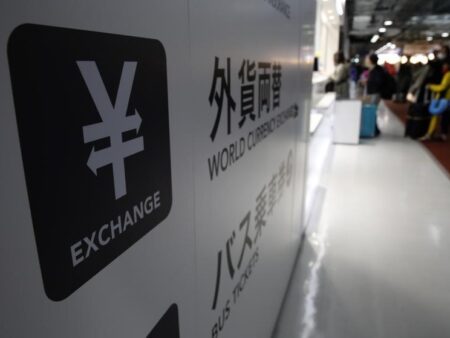BUENOS AIRES (Reuters) -Argentina’s central bank will slow the rate of the local peso’s devaluation, it said on Tuesday, after new data showed annual inflation slowing in December and as the central bank sees continued progress on inflation.
Beginning in February, the rate, known as the crawling peg, will slow to 1% per month from a prior rate of 2% due to “the consolidation observed in the inflationary trajectory during the last few months, and in the expectations of a decrease in inflation,” the central bank said in a statement.
Investors say the slower crawling peg for the peso could prolong a market rally that has been fueled by the pro-market policies of President Javier Milei and hopes for fresh IMF funds.
Milei, who took office in December 2023, has launched a nationwide austerity push, slashing many public budgets. While poverty rates have increased, price rises have steadily slowed down from eye-popping double-digit increases each month.
The central bank’s announcement came about an hour after official data showed that monthly inflation ticked up a tad in December, though the annual rate slowed further as Milei pushed tough spending cuts and austerity measures.
“We’re pulverizing inflation,” Argentina’s economy ministry said in a post on X.
The monthly rate, which came in at 2.7% as forecast by analysts, meant South America’s second-largest economy ended Milei’s first full year in office with annual inflation of 117.8%. The rolling 12-month rate has been slowing from an April peak near 300%.
Still, many Argentines feel the pinch to their wallets, with housing and utility costs leading the December price increases.
“People say inflation is going down, but here we always receive merchandise with different prices, it goes up and up,” said 77-year-old retiree Juan Carlos Gonzalez, who works at a produce stand to make ends meet.
Analysts said seasonal price rises were behind the slight acceleration from the 2.4% monthly inflation logged in November, and markets greeted the data as good news. Traders expect inflation to keep cooling in 2025.
The December data “confirms the disinflation process is continuing,” Economy Minister Luis Caputo said on X.
WHAT’S NEXT?
Traders have been betting that Argentina’s central bank will also cut the interest rate from its current 32%.

The central bank is expected to cut the interest rate by around 500 basis points, brokerage Max Capital said ahead of the inflation data’s release on Tuesday
While the central bank board meets every Thursday, a rate cut could come ahead of a Treasury tender on Wednesday, the company added.

















